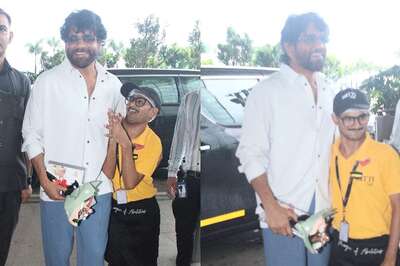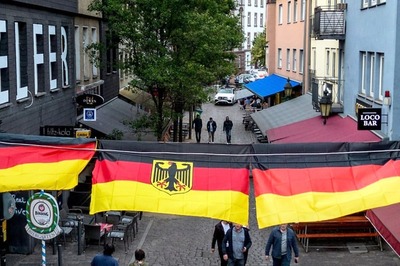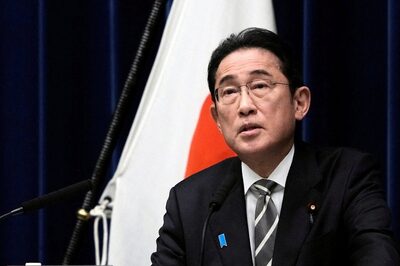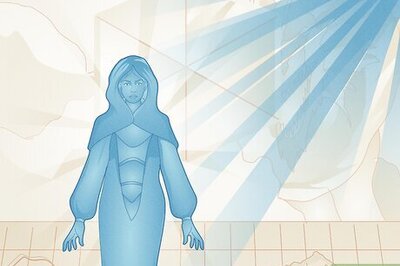
views
Benghazi: Forces loyal to Muammar Gaddafi hit back at rebels holding towns near the Libyan capital on Thursday but there was no sign they had broken the momentum of opposition gains that have been closing in around Tripoli.
With a spike in oil prices threatening prospects for a global economic recovery, the United States said it was keeping all options open, including sanctions and military action in response to the Libyan government's crackdown on the uprising.
US President Barack Obama called the leaders of Britain, France and Italy to discuss rescuing citizens trapped by the violence as well as holding Gaddafi to account. But fully coordinated international action against the man who has ruled the oil-rich desert nation of six million for 41 years seemed some way off.
In a rambling appeal for calm, Gaddafi blamed the revolt on al-Qaeda leader Osama bin Laden, and said the protesters were fuelled by milk and Nescafe spiked with hallucinogenic drugs.
Disparate opposition forces were already in control of major centres in the east, including the second city Benghazi. Reports from the west of the third city Misrata, as well as Zuara, also falling brought the tide of rebellion closer to Gaddafi's power base - though information from western Libya remained patchy.
In Misrata, which opponents of Gaddafi said they had taken on Wednesday, residents said loyalists and foreign mercenaries launched a counter-attack on Thursday but had been contained.
"The protesters have overcome the security forces and taken full control of the city," Mohamed Senoussi, 41, told Reuters by telephone from Misrata, 125 miles (200 km) east of Tripoli.
Gun battles in Zawiyah, an oil terminal 50 km (30 miles) west of the capital, left 23 people dead, a Libyan newspaper said. Al Jazeera quoted residents putting the toll at 100 there.
France's top human rights official said up to 2,000 people might have died so far in the uprising which began on February 15.
Western governments, which embraced Gaddafi and his oil in recent years after decades of isolating a leader once branded a "mad dog", struggled to find a common response to the crisis.
Talk of sanctions against the country, or against Gaddafi and his circle, swirled without clear agreement in view. Even a push by Western states to suspend Libya from the low-powered UN Human Rights Council met with strong resistance from Arab and some other Islamic states, as well as from Russia.
The Swiss government said it had frozen assets belonging to Gaddafi and his family. But Libya's foreign ministry denied that the leader had any such funds and said it would sue Switzerland.
Gaddafi, who just two days ago vowed in a televised address to crush the revolt and fight to the last, spoke to state television by telephone this time and sounded more conciliatory.
"Their ages are 17. They give them pills at night, they put hallucinatory pills in their drinks, their milk, their coffee, their Nescafe," Gaddafi said of the rebels fighting his forces.
A Tripoli resident, who did not want to be identified because he feared reprisals, told Reuters: "It seems like he realised that his speech yesterday with the strong language had no effect on the people. He's realising it's going to be a matter of time before the final chapter: the battle of Tripoli."
As governments and foreign companies scrambled to evacuate foreign nationals working in Libya, a US-chartered ferry remained trapped in Tripoli with 285 passengers on board.
US diplomatic cables from 2009 published by Wikileaks portrayed Gaddafi's family as a fragmented group, riven by greed, jealousy and ambition, casting doubt on how they might respond to their father's current plight.
Former Justice Minister Mustafa Mohamed Abud Al Jeleil, who quit this week, told a Swedish newspaper he expected the Libyan leader to commit suicide the way Adolf Hitler did at the end of World War Two, rather than surrender or flee.
Misrata resident Senoussi said he knew of seven civilians and several government troops and mercenaries who were killed.
"The protesters arrested 20 mostly African mercenaries and two Libyan soldiers. I have seen them in shackles," he said by telephone, adding that armed rebels were roaming the city outskirts in search of Gaddafi loyalists.
Al Jazeera quoted a senior officer who joined the rebels as saying the government used poisoned gas against demonstrators at Misrata's airport early on Thursday, but other Misrata residents said they were not aware of such an event.
Soldiers were reported along the roads approaching Tripoli. In Zawiyah, witnesses said pro- and anti-Gaddafi forces were firing at each other in the streets.
Libya's Quryna newspaper said 23 people were killed and 44 wounded in the town. Quoting medical sources it said "intense exchange of fire" was preventing the wounded from reaching hospitals. Some men were removing wounded kin from hospitals for fear of them falling into the hands of Gaddafi loyalists.
"It is chaotic there. There are people with guns and swords," said Mohamed Jaber, who passed through Zawiyah on his way to Tunisia on Thursday.
A witness told Reuters the Libyan army was present in force.
Anti-government militias were in control of Zuara, about 120 km (75 miles) west of Tripoli, residents said. There was no sign of police or military and the town was controlled by "popular committees" armed with automatic weapons.
In the east of Libya, many soldiers have withdrawn from active service and some are openly supporting the revolt.
Protesters have also taken control of Al Kufra, some 1,000 km (600 miles) southeast of Benghazi, Quryna newspaper said.
The uprising has virtually halted Libya's oil exports, said the head of Italy's ENI, Libya's biggest foreign oil operator. The unrest has driven world oil prices up to around $120 a barrel, stoking concern about the economic recovery.



















Comments
0 comment